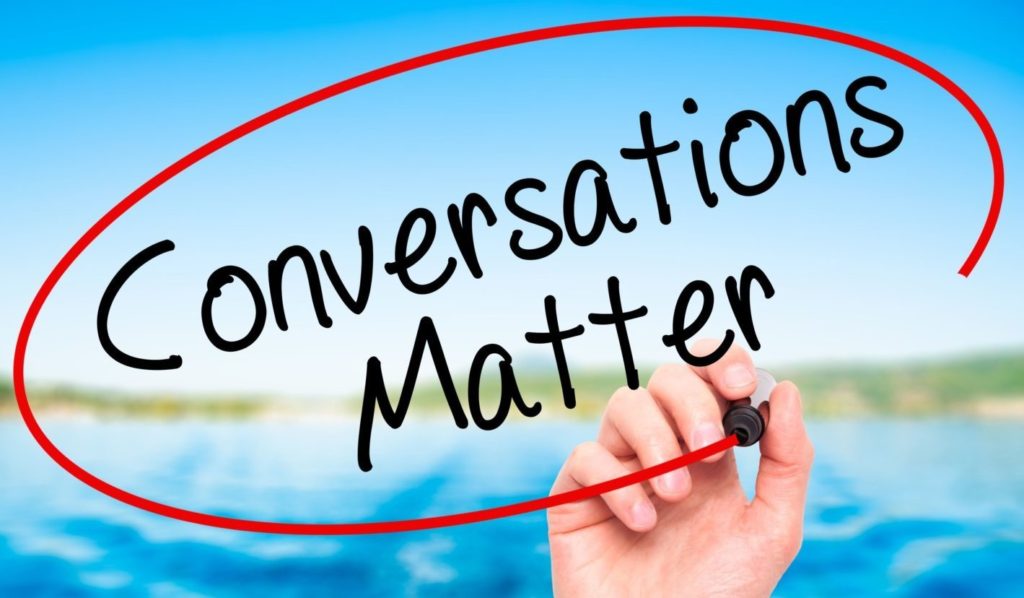
The most fruitful and natural exercise for our minds is, in my opinion, conversation. – Michel de Montaigne, The Essay: A Selection
As I was being escorted to a table in a restaurant not long ago, I passed by a family seated at a long table. There must have been five or six gathered around. What struck me as I passed by was not that they were all together or that they were laughing and talking and otherwise engaged with one another. Sadly, it was an all too familiar sight.
Every person at the table had their smartphone device in their hand and was using it. No conversations were taking place. It was just a group of people sitting together, but very far removed from one another.
According to Google, a survey by Pew Research Center revealed that many people find phone usage during dinner obnoxious. Of those people surveyed, 88 percent think it is okay to use a phone during dinner and 82 percent thinks that using a phone in social settings can hurt conversations.
I realize that we are addicted to our devices. I am clear-eyed in my understanding that it’s just a part of the fabric of our culture for better or worse.
Be it because of our electronic devices or any other distractions that come along, we are increasingly losing the art of meaningful conversation. It takes a toll on relationships, and yes, it can take a toll on your leadership if you are not careful.
Writing in his book, Didn’t See It Coming, bestselling author, Carey Nieuwhof devotes a chapter as to why so many us feel alone and to the demise of genuine conversation. He writes about what many have come to know. He writes:
“Sadly, conversations seem to be developing into an exchange of monologues among people who don’t seem terribly interested in one another. People today appear to be talking at one another more than they’re talking with one another. Next time you’re in a conversation with someone, wait to see how often you get asked a question.”
What about you? What’s been your experience with this issue?
From a leadership point of view, I believe having meaningful conversations is one of the key ingredients to developing effective leadership skills. Here’s why I think it so important and why we must return to them.
Meaningful conversations put you squarely in the moment
Unlike an email that can be put off or an incoming call or text that can be ignored, meaningful face to face conversation puts you in the moment as nothing else can Click To Tweet. It’s your chance to give someone else your undivided attention. Be in the moment.
Meaningful conversations give you the necessary context
There’s just no substitute for meaningful conversations. It gives you the advantage of understanding fully from the source in a way that other forms of communication can’t deliver. Meaningful conversation strips away any chance of misunderstanding when you’re engaged with the source. Leadership in context is invaluable. Click To Tweet
Meaningful conversations teach you to slow down and listen
Leaders are busy people. Too busy at times. But when you engage in meaningful conversation it’s sharpening this all-important leadership skill. Too often our thoughts are elsewhere and we are not really tuned in when talking with our people. Meaningful conversations are not rushed. They’re thoughtful. It may try your patience or seem inconsequential to you, but it can make all the difference to the one you are conversing with. Slow down and listen.
Meaningful conversations enhance trust
Nothing can build trust like meaningful conversations. They accomplish more than the tech devices that supposedly making communicating easier. Trust is the glue that binds your organization together and gives your leadership the credibility its due. Don’t allow your busy schedule or other demands rob you of this most essential leadership ingredient. Initiate meaningful conversations. Have meaningful conversations. Build trust.
Meaningful conversations are all about relationships
The secret sauce in leadership is relationships. It’s all about people. The depth of your relationships in large part depends upon the depth of your conversations. Let the focal point of your conversations be more about the people you lead. Listen more. Talk less. When the people you lead have your ear, you will have their heart. Click To Tweet Don’t pretend it’s all about you. It’s not. You will build stronger relationships by having more meaningful conversations.
It’s time to get back to meaningful conversations. Your leadership depends on it.
©2019 Doug Dickerson
